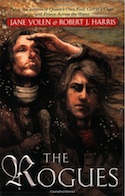
Stuart Quartet: The Rogues

THE ROGUES
with Robert J. Harris
Philomel 2007
ISBN-10: 0142412066
ISBN-13: 978-0142412060
The Stuart Quartet:
The last of the Stuart quartet—and originally titled Rogue’s Apprentice except that the publisher had launched a hugely successful “Apprentice” series and didn’t want it confused with that—this book takes place during the Highland Clearances. That was the time the Scottish lairds decided it made more monetary sense to pasture sheep on their land and so kicked off the tenant farmers (members of their own clans) by burning them out or beating them up or even murdering them. Some were moved forcibly to other parts of Scotland (the Duke of Sutherland moved thousands of people to the coast and told them that henceforth they were to be fishermen!) but most were shipped off to Canada, Australia, and America. This is a story of one boy and his family and the people of their glen who suffered the same fate.
Bob Harris and I had a rollicking time with this book which is in some ways the most romantic of the four Scottish historicals. And never did he have to say—as Scotsmen sometimes are wont to do—”Haud yer wheesht, woman!”
Accolades:
- A Junior Library Guild book
What reviewers have said:
- “[S]uspense mounts and the plot races along flawlessly in this excellent historical adventure.”—Booklist, starred review
- In the late 1700s and early 1800s, many Scottish lairds discovered that they could make money by leasing their land to English sheep farmers. As a result, thousands of poor Highlanders were removed from their homes. Roddy Macallan and his family are tenant farmers, and they have always relied on their laird to be a provider and protector. Now he is dead, and the greedy and cruel new man cares little for clan traditions and his responsibility for his people. He sends his brutal factor, Willie Rood, to burn out the villagers and take their livestock. Enraged, Roddy sneaks back to the village to find the family “Blessing” that his deceased mother always told stories about. He finds it, a valuable brooch given to an ancestor by Bonnie Prince Charlie, but Willie Rood steals it for the laird. Roddy is nearly beaten to death, but is saved by the outlaw Alan Dunbar, who then trains him as his apprentice…The authors deftly weave historical facts into their action-packed adventure…thoroughly engaging. They write in Scottish dialect and syntax, which readers should get the hang of fairly quickly. The story would make a great read-aloud for anyone who would like to tackle the accent.”—School Library Journal
- “Roddy’s first-person narrative moves along at a quick and witty pace. The exchanges between Roddy and Willie Rood, the laird’s hired thug, will have readers cheering for the young hero. The characters of Bonnie Josie and Alan Dunbar are wonderfully written and add a sense of hope to Roddy’s almost impossible quest. It is a story of honor, the willingness to believe, and personal growth. The novel is an excellent end to a top-notch series…”—VOYA
- “[T]he authors weave strong feelings and a clear sense of setting into a story that gains momentum as it progresses and also ends happily. A good finish to the quartet, with echoes of Robert Louis Stevenson’s Kidnapped to savor.”–Kirkus
- “This powerful and adventure filled story brings the Scottish highlands to life.”—KidsBookshelf.com
- “A a nice piece of historical fiction that offers a peephole into an old culture and provides a glimpse at the brighter side of immigration in the earlier days of America, when people still believed the streets were paved with gold. Certain parts of the book could be used as jumping off points for research projects or history lessons. Others could provide a context for discussions about morals, politics, or economy. A more in-depth lesson could be structured around the culture of working-class Scots, their traditions, their beliefs, and family dynamics.”—Children’s Literature